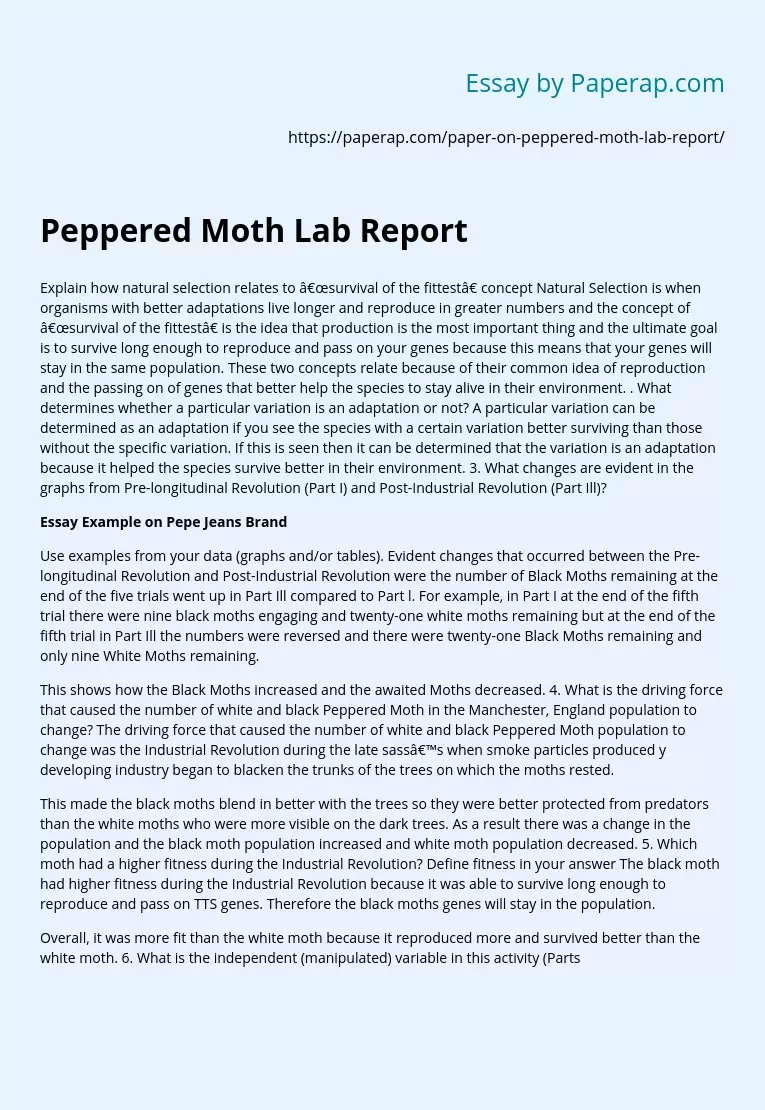Peppered Moth Lab Report
Explain how natural selection relates to “survival of the fittest” concept Natural Selection is when organisms with better adaptations live longer and reproduce in greater numbers and the concept of “survival of the fittest” is the idea that production is the most important thing and the ultimate goal is to survive long enough to reproduce and pass on your genes because this means that your genes will stay in the same population. These two concepts relate because of their common idea of reproduction and the passing on of genes that better help the species to stay alive in their environment.
. What determines whether a particular variation is an adaptation or not? A particular variation can be determined as an adaptation if you see the species with a certain variation better surviving than those without the specific variation. If this is seen then it can be determined that the variation is an adaptation because it helped the species survive better in their environment. 3. What changes are evident in the graphs from Pre-longitudinal Revolution (Part I) and Post-Industrial Revolution (Part Ill)?
Essay Example on Pepe Jeans Brand
Use examples from your data (graphs and/or tables). Evident changes that occurred between the Pre-longitudinal Revolution and Post-Industrial Revolution were the number of Black Moths remaining at the end of the five trials went up in Part Ill compared to Part l. For example, in Part I at the end of the fifth trial there were nine black moths engaging and twenty-one white moths remaining but at the end of the fifth trial in Part Ill the numbers were reversed and there were twenty-one Black Moths remaining and only nine White Moths remaining.
This shows how the Black Moths increased and the awaited Moths decreased. 4. What is the driving force that caused the number of white and black Peppered Moth in the Manchester, England population to change? The driving force that caused the number of white and black Peppered Moth population to change was the Industrial Revolution during the late sass’s when smoke particles produced y developing industry began to blacken the trunks of the trees on which the moths rested.
This made the black moths blend in better with the trees so they were better protected from predators than the white moths who were more visible on the dark trees. As a result there was a change in the population and the black moth population increased and white moth population decreased. 5. Which moth had a higher fitness during the Industrial Revolution? Define fitness in your answer The black moth had higher fitness during the Industrial Revolution because it was able to survive long enough to reproduce and pass on TTS genes. Therefore the black moths genes will stay in the population.
Overall, it was more fit than the white moth because it reproduced more and survived better than the white moth. 6. What is the independent (manipulated) variable in this activity (Parts l, II, and Ill)? (hint: this variable is graphed on the x-axis) The independent variable is the number of trials performed. 7. What is the dependent (responding) variable in this activity (Parts l, II, and Ill)? (hint: this variable is graphed on the y-axis). The dependent variable is the number of moths remaining after each trial. Extra-credit Question: .
What aspect of natural selection (evolution) does the following step in the activity represent: “At the end of each trial, replace each black moth removed with a white moth. Replace each white moth removed with a black moth. ” Explain your answer. Speciation is the aspect of evolution that best represents the white and black moths being replaced by each other. This activity shows how favorable adoptions gradually accumulate in the population and overtime the adaptation overtakes the entire population and a new species is eventually forms. This activity represents the process of speciation.
Peppered Moth Lab Report. (2019, Nov 27). Retrieved from https://paperap.com/paper-on-peppered-moth-lab-report/

